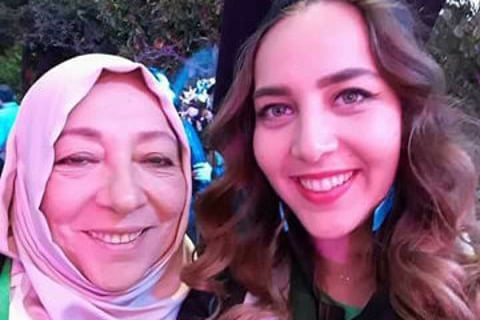Refugees mourn slain Syrian activist
Refugees recount Orouba’s philanthropic work helping them as activist community mourns her ‘heinous’ murder

Istanbul: A Syrian activist and her daughter, a journalist, found murdered in their apartment in Istanbul on Thursday came from a large family known for its long opposition to President Bashar Al Assad of Syria and his predecessor and father, Hafez Al Assad.
Orouba Barakat, 60, and her daughter, Halla Barakat, 22, were discovered Thursday night in Uskudar, on the Asian side of the city.
The two women were both active in the Syrian refugee community in Turkey.
Orouba Barakat was a member of the opposition Syrian National Council, now known as the Syrian National Coalition, but she had also criticised some members of the opposition.
Halla Barakat was an editor for Orient TV, which covers events in the Middle East, and had also worked for the Turkish Radio and Television Corp.
While there was no official confirmation of the circumstances of the deaths, friends and relatives said the Al Assad government was to blame.
“For 40 years her headlines occupied front pages. She sought out criminals and exposed them. And today, her name and Halla’s name are on the front page,” Shaza Barakat, Orouba’s second daughter wrote on Facebook.
The two women “were vocal activists in the Syrian revolution, speaking truth to power, and raising awareness about the atrocities committed by the Al Assad regime,” another relative, Suzanne Barakat, wrote on Facebook.
In a statement, the Syrian National Coalition said, “The hand of terrorism and tyranny is the prime suspect in this heinous crime of assassination.”
Social media posts on pro-government sites contained hateful comments about the Barakats.
Orouba Barakat had received threats in the days before her killing but had disregarded them, her brother, Maen Barakat, 56, said in a telephone interview.
“Since threats by the regime have become a common thing, she didn’t pay much attention to them,” he said.
“No items were stolen from the apartment, which suggests that the crime was committed only to kill Orouba and Halla,” he added.
His sister was a born activist, he said. “She dedicated her life to give voice to the voiceless, until the Syrian regime exiled her in the ‘80s,” he said.
“But still she continued to defend her rights and the rights of others.”
She set up a media and advertising business in Kuwait and the United Arab Emirates, and after the Syrian uprising moved to Istanbul.
“She came to Turkey to be closer to her country, hoping that once the war ends she would be able to return to her homeland,” Maen Barakat said.
“Halla joined her mom in her fight against the Syrian regime, and became a loud voice in defending the rights of Syrians and documenting the crimes against them.”
Halla Barakat “was beautiful and lovely, smart and ambitious, and so kindhearted,” said Jamal Mano, a Syrian journalist who worked for 10 months with her in Istanbul.
A Syrian refugee in Germany, Nour Shaikh Ebrahim, wept as he remembered the kindness Orouba Barkat had shown him when he defected from the Syrian army and escaped to Turkey.
“She was everything in my life, she was like my aunt,” Ebrahim said when reached by telephone. “She helped me a lot.”
Jobless and penniless, he had appealed to Orouba Barakat for help and when she opened a sewing factory she offered him a job.
“She used to help refugees, and the camps,” he said. “She was very active. She helped lot of Syrians with money, even those who didn’t deserve it.” Later in Istanbul she gave him a place to stay.
They remained in touch, talking every few days, and he said Orouba Barakat had become depressed recently.
“In the past few weeks Orouba was feeling so down,” he said. “I asked her to leave Turkey but she said she couldn’t.” She lacked a valid passport, he added.
“I remember she used to receive a lot of threats on her phone,” Ebrahim said.
Tragic coincidence
Three members of the extended family—a cousin, Deah Barakat, and his wife and her sister, who were studying in the United States—were shot dead in Chapel Hill, North Carolina, in 2015 in a case that authorities investigated as a possible hate crime.
23-year-old Deah Barakat, his 21-year-old wife Yusor Abu Salha, and her 19-year-old sister Razan Abu Salha, were killed Feb. 10, 2015 in the couple’s apartment.
No federal charges have been brought against Hicks.
A judge ruled in April 2015 that prosecutors can seek the death penalty against the now 48-year-old, who’s charged with three counts of first-degree murder.
No trial date has been set yet. At the time of the killings, Deah and Yusor were newlyweds, just married that December.
Barakat was enrolled at the UNC School of Dentistry and his wife had just completed her biology degree at NC State and planned to begin her dental studies at UNC



